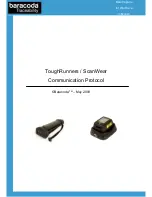
6 Security functions
SINAUT MD741-1
72
C79000-G8976-C236-05
To IP address
Enter the IP address in the local network to which IP packets may be sent. Do this
by specifying the IP address or an IP range of the application in the local network.
0.0.0.0/0
means all addresses.
To specify a range, use the CIDR notation - see the Glossary.
To port
Enter the port to which the external remote station is allowed to send IP packets.
Action
Select how incoming IP packets are to be handled:
Accept
– The data packets can go through,
Reject
– The data packets are rejected, and the sender receives a corresponding
message.
Drop
– The data packets are discarded without any feedback to the sender.
Firewall Rules, outgoing
The Firewall Rules (Outgoing) are used to define how to handle IP packets that are
received from the local network. The source is an application in the local network.
The destination is an external remote station, e.g. on the Internet or in a private
network.
In the factory settings, no outgoing firewall rule is set initially, i.e. no IP packets can
go through.
New
Adds an additional firewall rule that you can then fill out.
Protocol
Select the protocol for which this rule will be valid. The following selections are
available:
TCP, UDP, ICMP
. If you select
All
, the rule is valid for all three protocols.
From IP addresse
Enter the IP address of the local application that is allowed to send IP packets to
the external network. Do this by specifying the IP address or an IP range for the
local application.
0.0.0.0/0
means all addresses.
To specify a range, use the CIDR notation - see the Glossary.
















































